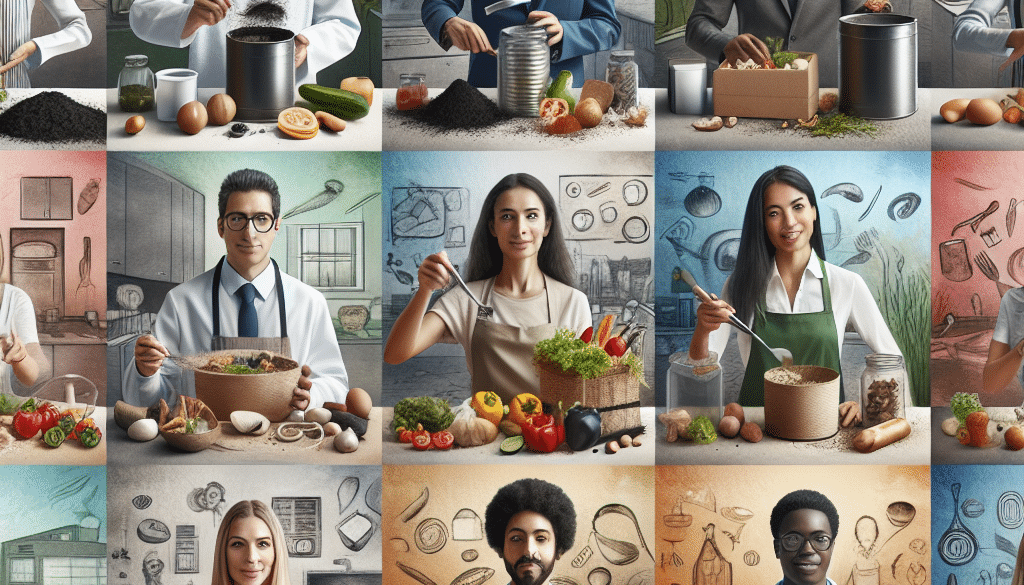Dietitians Provide 9 Ways to Repurpose Food Waste
-
Table of Contents
- 9 Expert Tips to Repurpose Food Waste: Dietitians’ Sustainable Solutions
- 1. Transform Vegetable Scraps into Nutrient-Rich Broth
- 2. Create Compost for a Garden Boost
- 3. Repurpose Fruit Pulp from Juicing
- 4. Turn Stale Bread into Croutons or Bread Crumbs
- 5. Regrow Vegetables from Scraps
- 6. Use Coffee Grounds as a Natural Exfoliant
- 7. Prepare Pickles from Leftover Produce
- 8. Make Bone Broth from Meat Scraps and Bones
- 9. Craft Homemade Apple Cider Vinegar
- Conclusion
- Discover ETChem’s Protein Products
9 Expert Tips to Repurpose Food Waste: Dietitians’ Sustainable Solutions

Food waste is a global issue with significant environmental, economic, and social implications. According to the Food and Agriculture Organization of the United Nations, approximately one-third of all food produced for human consumption is lost or wasted. This not only contributes to hunger but also to the wastage of resources used in food production and increased greenhouse gas emissions. However, dietitians around the world are advocating for innovative ways to repurpose food waste, turning what would be trash into nutritious treasures. Here are nine ways to repurpose food waste, as recommended by dietitians.
1. Transform Vegetable Scraps into Nutrient-Rich Broth
Vegetable peels, stems, and leaves are often discarded, yet they are packed with nutrients. Dietitians suggest collecting these scraps in a freezer-safe container until you have enough to make a homemade vegetable broth. Simply boil the scraps with water, herbs, and spices to create a flavorful base for soups and stews.
2. Create Compost for a Garden Boost
Composting is a natural process that turns organic waste into a valuable fertilizer for gardens. By composting food scraps like fruit peels, coffee grounds, and eggshells, you can enrich soil with nutrients and beneficial microorganisms. This not only reduces waste but also promotes healthier plant growth.
3. Repurpose Fruit Pulp from Juicing
After juicing fruits, the remaining pulp can be repurposed in a variety of ways. Dietitians recommend using it to add fiber to baked goods, such as muffins and bread, or to thicken smoothies and soups. You can also dehydrate the pulp to make fruit leather or add it to homemade granola.
4. Turn Stale Bread into Croutons or Bread Crumbs
Stale bread doesn’t need to be thrown away. Instead, cube it and toss with olive oil and seasonings to make homemade croutons. Alternatively, you can grind stale bread into breadcrumbs, which can be used for coating meats, topping casseroles, or adding texture to meatballs and veggie burgers.
5. Regrow Vegetables from Scraps
Certain vegetables like green onions, lettuce, and celery can be regrown from their scraps. Dietitians suggest placing the roots in a container with water and watching as new shoots emerge. Once they’ve grown sufficiently, you can plant them in soil to continue their growth.
6. Use Coffee Grounds as a Natural Exfoliant
Used coffee grounds are rich in antioxidants and make for an excellent natural exfoliant. Mix them with a bit of coconut oil or honey to create a homemade body scrub. This not only reduces waste but also provides a chemical-free skincare option.
7. Prepare Pickles from Leftover Produce
Pickling is a great way to extend the life of leftover or slightly wilted produce. Vegetables like cucumbers, carrots, and beets can be preserved in a vinegar-based brine, along with herbs and spices. This not only prevents waste but also creates a delicious and healthy snack.
8. Make Bone Broth from Meat Scraps and Bones
Meat scraps and bones that would otherwise be discarded can be boiled to make a nutritious bone broth. Dietitians note that bone broth is rich in minerals and collagen, which can support joint health and digestion. It can be sipped on its own or used as a base for soups and sauces.
9. Craft Homemade Apple Cider Vinegar
Apple cores and peels can be used to make homemade apple cider vinegar. By fermenting these scraps with sugar and water, you can create a versatile product that can be used for cooking, cleaning, and as a health tonic. This process not only reduces waste but also provides you with a homemade staple.
Conclusion
Repurposing food waste is not only environmentally responsible but can also be a creative and nutritious way to make the most of our resources. By implementing these nine dietitian-recommended methods, you can reduce your carbon footprint, save money, and enjoy a variety of new and healthy homemade products. From making broths and compost to regrowing vegetables and crafting homemade vinegar, the possibilities are endless. It’s time to view food scraps not as waste, but as an opportunity for innovation in the kitchen.
Discover ETChem’s Protein Products
After learning about sustainable food practices, it’s also important to consider the quality of the proteins we consume. ETChem offers a range of high-quality collagen products that can complement a waste-conscious lifestyle. Whether you’re looking for marine, bovine, or chicken collagen, ETChem has a product to meet your needs. Their collagens are perfect for various applications, including nutraceuticals, pharmaceuticals, and food and beverage products. By choosing ETChem, you’re not only making a choice for sustainability but also for premium protein supplements.
About ETChem:
ETChem, a reputable Chinese Collagen factory manufacturer and supplier, is renowned for producing, stocking, exporting, and delivering the highest quality collagens. They include marine collagen, fish collagen, bovine collagen, chicken collagen, type I collagen, type II collagen and type III collagen etc. Their offerings, characterized by a neutral taste, instant solubility attributes, cater to a diverse range of industries. They serve nutraceutical, pharmaceutical, cosmeceutical, veterinary, as well as food and beverage finished product distributors, traders, and manufacturers across Europe, USA, Canada, Australia, Thailand, Japan, Korea, Brazil, and Chile, among others.
ETChem specialization includes exporting and delivering tailor-made collagen powder and finished collagen nutritional supplements. Their extensive product range covers sectors like Food and Beverage, Sports Nutrition, Weight Management, Dietary Supplements, Health and Wellness Products, ensuring comprehensive solutions to meet all your protein needs.
As a trusted company by leading global food and beverage brands and Fortune 500 companies, ETChem reinforces China’s reputation in the global arena. For more information or to sample their products, please contact them and email karen(at)et-chem.com today.




